#tlou meta
Text
I just realised something from the TLOU gameplay that made me so depressed that I needed to share with you all.
Rewind back to the prologue where Sarah is dying, and we see Joel look away from her a total of two times before she dies: the first time is at the same moment the camera pans to solely Tommy, of whom Joel is looking at (first image). Before he is out of shot, Joel can just be seen looking to Sarah again, until the camera turns back to him where he looks away a second time towards Tommy again (second image).
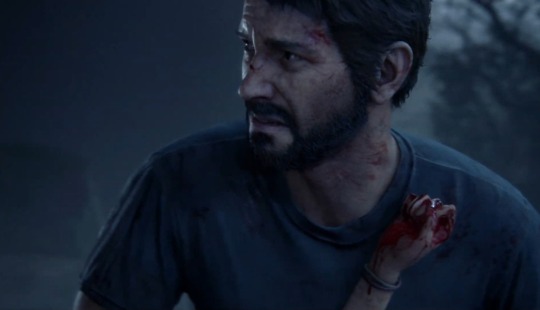
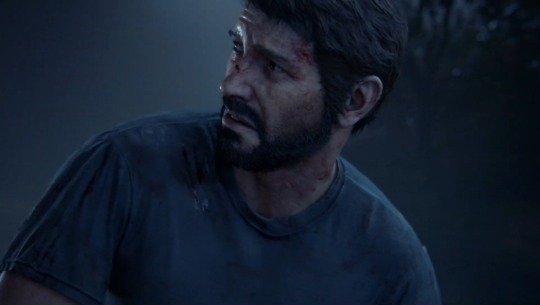
Now, if you go and listen to the audio of the actual scene itself, you'll notice that the second time he looks away is when Sarah draws her last breath and passes away. She's already dead now.
And Joel missed it by looking away for only a second.
The second time he looks away and then looks back at Sarah, she is already gone. He couldn't do anything. He couldn't look into her eyes, still filled with life (albeit hanging on a thread) anymore before becoming absolutely soulless because he missed it. He didn't see the light leave her, he didn’t see her succumb to the bullet wound where she would move on to no longer feel anymore pain in death. He missed it almost instantly. His last good look of her is after the second time he looked away, when she's already passed on.
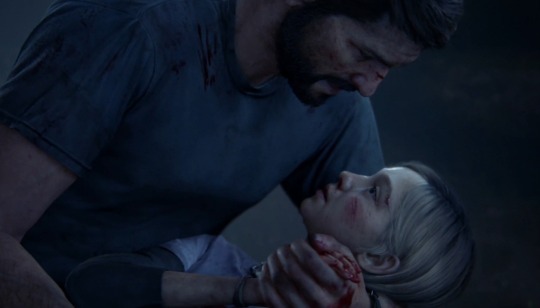
But then we fast-forward to the very near end of the game where Joel is trying to perform CPR on Ellie after she almost drowned. He's becoming mentally and emotionally frantic because he cannot lose another one and projects this by trying to resuscitate her. He is back to where he was twenty years prior trying to save Sarah. And then the Fireflies appear.
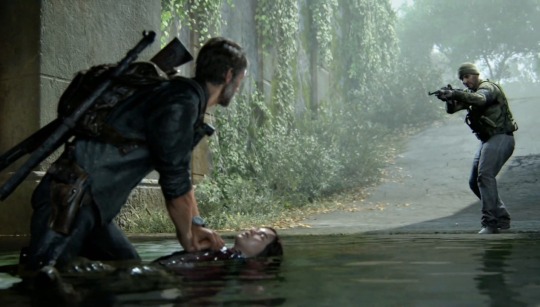
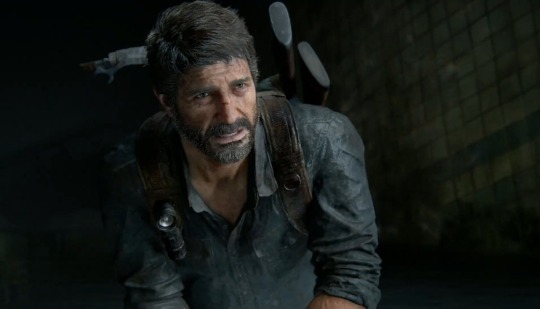
Joel looks away from Ellie one time. He probably doesn’t even realise that these are Fireflies (they could have been Hunters or even FEDRA for all he cared). The look on his face in the second image is heart-breaking, but it only lasts for a second before he immediately looks down to Ellie.
He only looks up at them once. He doesn’t look up a second time.
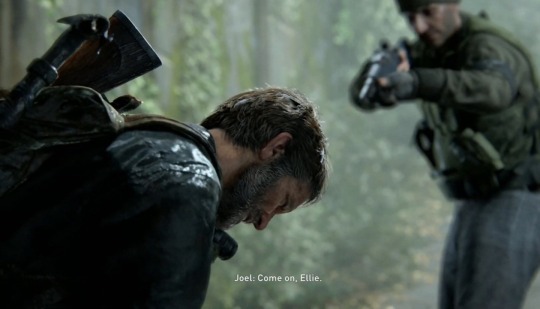
Again, if you watch the original scene with audio enabled, you can hear the shakiness in Joel's voice, almost tearfully and very much coming from a place of fear. He's literally pleading for Ellie to wake up, all the while keeping his eyes on her - not looking up again - not even with one of the Firefly soldiers approaching him with an armed weapon.
He can't look away a second time because the last time he did, he lost Sarah immediately. He fears that will happen again, but he cannot let that occur. He won't. Not with Ellie: his second chance, his new reason to live, his new love. Joel refuses to tear his eyes away from her, even for another second, if it risks her life suddenly slipping away before he could even realise it.
He cannot afford to have another daughter lay lifeless in his arms and have her drift off to a place where he cannot follow and protect her anymore, even if it means placing his own life on the line.
#ranna word dumping#i'm feeling sad about this discovery so you guys should too#you're welcome#the last of us#the last of us hbo#the last of us game#the last of us part 1#the last of us part 2#the last of us series#tlou#joel and ellie#joel miller the last of us#ellie williams the last of us#the last of us ellie#the last of us joel#tlou joel#tlou ellie#joel miller#ellie williams#tlou meta#meta analysis#meta post#elliespuns
525 notes
·
View notes
Text
I think one small and perhaps overlooked moment of foreshadowing that tells you who Joel is at his core is when the pandemic first breaks out, and he, Sarah, and Tommy are in the car, and they have a choice as to whether to stop for the family with the baby. And Joel immediately says no. Tommy says, “They have a kid!” And Joel says, “We have a kid too.” That’s it. No hesitation. No questioning. He has defaulted to protecting the unit in the car. His daughter and his brother. He will not risk their lives. His compassion for strangers, for “doing the right thing”, cannot be appealed to. He’s not torn. He makes the choice of a survivor, and he needs his family to survive because they are his reason for being. This aspect of him follows him everywhere, right down to the very end in the hospital. He couldn’t give two shits about saving humanity/strangers, not in comparison to how much he loves Ellie. “He has a kid too.” And why his kid over anyone else’s?
In the hospital, he gets driven to a more severe degree of remorselessness because he had lost his kid, and he will never, ever let it happen again. He has made it clear: losing a kid means there is no point in living. If he lost a child for a second time, I’m willing to bet he wouldn’t flinch.
#the last of us#joel miller#tlou#tlou meta#tlou spoilers#i wanna be on his side but at the same time the truth of it is that he made a self-serving and terrible decision#but it’s a decision that is understandable and it is so fucking sad#anyway i love him and this story#it was not a black and white thing
1K notes
·
View notes
Text
I don’t know why I missed this the first time, but the way Joel was portrayed during the 2003 portion of episode 1 makes more sense now that it’s (possibly) canon that he was a Gulf War veteran. You can tell he’s haunted from his experiences by the way he seems like he’s always a mess, to how he feels awkward around Sarah and Tommy, and to how he tried to remain calm when Sarah was shot.
Making Joel a military veteran also works for the story since it explains why he’s so good at fighting and how he survived for so long.
#tlou meta#Joel Miller meta#the last of us#tlou#hbo tlou#tlou hbo#joel miller#pedro pascal#hbo max#hbo the last of us#sarah miller#tommy miller#naughty dog#the last of us meta#tlou joel
783 notes
·
View notes
Text

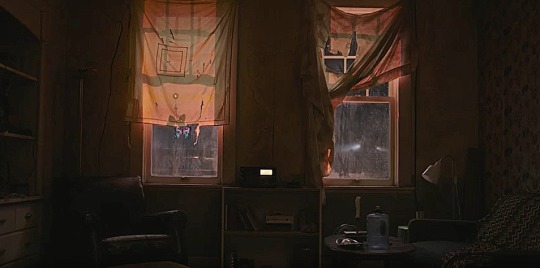
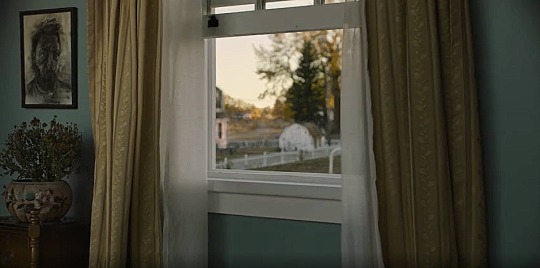


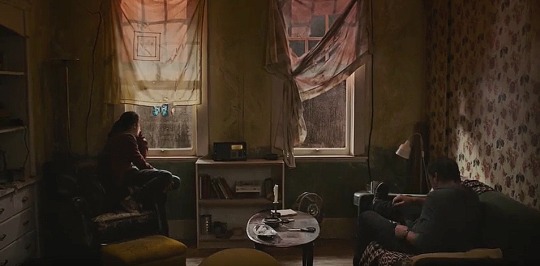

You know what, fuck you *traumatizes all of your windows*
#serisoulsy WHAT is their thing with goddamn windows#giving us emotional trauma#fucking christ#anyway#tlou#the last of us#hbo the last of us#the last of us series#hbo tlou spoilers#tlou spoilers#tlou hbo#meta#tlou meta#symbolism#ellie williams#ellie tlou#joel miller#henry tlou#tess tlou#joel and tess#sam tlou#joel and ellie
350 notes
·
View notes
Text
Idk if anyone’s talked about this but I think part of the reason the story of The Last of Us is so compelling is because it isn’t just “father and daughter duo must survive against all odds”, it’s “traumatized man and teenage girl must choose to become father and daughter to each other to survive despite everything it is going to cost them.”
Like obviously there are many stories about survival, many stories about love, many stories about family, and even many stories about adoptive or chosen family. But I think its somewhat rare to find a story that is centered around the process of a single relationship falling into familial love, specifically parent/child love. Parental love is most often depicted and assumed to be automatic, biological and instinctual. It is not often depicted to be a choice. Similarly, a child’s love for a parent is often depicted as purely arising from selfish need rather than genuine connection.
And that’s not to say that Ellie and Joel’s love for each other is not selfish, needy, and instinctual - because it definitely has those elements - but it’s by no means obligatory. So many of us get raised by parents who we don’t feel like actually know or even like us, but still love us because we’re their children. And as children we might feel like we don’t really get our parents, but we still love them because they’re our parents. There’s no real intimacy.
It’s also not automatic. It takes time - first they resist each other, then they begrudgingly rely on each other, and then they have moments where they recognize parts of themselves in each other. Ellie being darkly fascinated and inspired by Joel’s violence and toughness because she longs to be able to protect herself like that. Joel being slowly thawed by Ellie’s feral joy and juvenile humor, reminding him of what it was like to be alive and excited by life, and being in immense pain at the realization of how much innocence she’s had to lose to survive because he’s lost so much of it in himself. There’s a deep understanding and intimacy that develops on both sides as a result, despite both of them being intimacy-phobic and horrible at talking about feelings. (There’s also of course the shared trauma, which aside from the strong bonds that creates in and of itself, at the very least gives them an excuse to have these moments of understanding without being overly mushy about it.)
The love that they feel for each other is also not just something that naturally develops - it emerges from a series of choices they make that have immense consequences. Joel making a promise to take Ellie to the fireflies for Tess as her dying wish, knowing he won’t back out because that promise is all he has left of her. Ellie shooting that guy to save Joel and Joel finishing the job so she doesn’t have to, leading to both of them opening up about the past violences they’ve committed. Joel giving Ellie a gun and teaching her how to shoot, in a way consenting to the loss of her innocence and knowing he won’t be able to stop himself from worrying about her nor will he be able to stop her from looking up to him. Her decision to bring up Sarah knowing it will hurt him, him hurting her in turn, almost leaving and then deciding to come back, to continue, knowing he’s way past the point of no return, that the doors of grief have been blown wide open and there’s no coming back from this. Ellie deciding to stay with him as he lays there dying, telling her to go, finding a fucking needle and thread to stitch him up with, having no idea what she’s doing, starving for food as she waits for him to get better, when it would have been so much safer to leave like he told her, going through all of that hell with David, Joel fighting for his life to get to her - every choice they make escalates them further and further into commitment and devotion. The consequences for that devotion get bigger and bigger, and yet they still choose it.
This of course culminates to Joel’s final choice at the end, which was not really a choice so much as the natural consequence of every other choice that led up to it. Not only the choices they made to keep each other alive, but also the choices that led to failures. Despite the fact that neither likely would have survived on their own, they’re also permanently changed by each other in ways that are not all positive. Joel knows that loving Ellie means running the risk of failing her, over and over again, just like he failed Sarah; and that to protect her means having to commit larger and larger acts of violence to keep her safe. Ellie knows that loving Joel means running the risk of being abandoned if he leaves or dies, and sticking with him means uncovering a violence in herself she will never be able to unsee. But they both still choose it anyway. They choose each other over and over again, without obligation, despite harrowing, soul-shattering, world-ending consequences. Is it healthy? Definitely not. But that’s what makes it so fucking powerful.
To see this level of insanity-fueling, logic-defying love depicted between a chosen parent/child relationship is extremely unconventional and incredibly alluring. I think it profoundly challenges the societal delusion that romantic love is stronger than anything else, while also challenging the supremacy of family defined by blood. It also shows that both the beautiful, healing, and dark, violence-ensuing sides of love do not emerge as part of some mysterious and random force, but rather results from the continual choice to save one another and be saved; to see one another and be seen; to know one another and be known.
#tlou#tlou hbo#tlou meta#the last of us#tlou analysis#the last of us meta#joel miller#ellie williams#tlou spoilers#joel and ellie
217 notes
·
View notes
Text
The irony of Kathleen's words to Henry.
"Did you stop to think that maybe he was supposed to die?... Well, kids die, Henry. They die all the time."
She's so blinded by her own selfish need for revenge to hear the hypocrisy of her own words. As if the same logic couldn't be applied to the death of her brother, Michael. People die all the time. Perhaps, Michael was supposed to die. After all, Perry says Michael was a great man but, he didn't change anything.
"You think the whole world revolves around him? That he's worth everything?"
Kathleen then goes onto say, as she stands there with an entire army behind her, using the people who look to her for leadership to exact her own sense of justice because Henry dared to put his brother's life above her brother's life. The same brother who Kathleen admits wanted her to forgive Henry.
Kathleen was right. Michael was beautiful and she wasn't. She was ugly on the inside and her ugliness cost her her own life and the lives of all those people who put their faith and trust in her.
#the last of us hbo#tlou hbo#the last of us hbo spoilers#tlou hbo spoilers#Henry and Sam#kathleen tlou#tlou meta
119 notes
·
View notes
Text
thinking about how for both joel and tommy the first time they killed someone after the outbreak was to save sarah. joel killed nana adler to stop her from infecting sarah. tommy killed the soldier who shot at sarah (and joel) but he was too late to save sarah but he saved joel and maybe tommy understands a little bit more than joel realizes when joel tells him about being too slow to save ellie and about fearing he's failing at protecting her
51 notes
·
View notes
Text
warning for tlou ep 4 spoilers (and TLOU Part 2) but:
not to be horribly meta on main but I'm mainly screaming over how this episode exemplified how well this story was adapted to a television format, ESPECIALLY regarding the themes that ND has repeatedly stated he wanted to explore in the TLOU Part 2 that maybe didn't quite land the way he meant them to
(Benioff and Weiss and their hatred for eighth grade book reports should be taking copious notes rn lol)
I remember when the second game came out and there was this big to-do about how the perspective towards "villains" had changed - not just in the fact that you spend half the game playing as Abby (Joel's killer), but that the developers had actually given names to all the NPCs that end up as cannon fodder for the player. The AI was supposed to be so advanced that for every enemy you killed as either Abby or Ellie, the NPC would beg for their life or curse you as you make the final blow or whatever, and then when their NPC friends found them you would hear their wailing and crying out for "Beck" or "Miranda" or whomever the fuck and the whole idea was that it was supposed to make you the player really think about the implications of taking a human life and the cycle of revenge yadda yadda yadda.
Which is a GREAT CONCEPT, but I just remember how...tedious it became, after a while. TLOU Part 2 got a lot of flak for a lot of reasons (some more valid than others imo) but I personally think its impossibly difficult to instill the lesson of "taking a life is something that carries real emotional weight" through the medium of a video game where you are mowing down LITERALLY HUNDREDS OF PEOPLE. That's just par for the course - you end up killing so many people that after a while their names mean nothing, BECAUSE THERE'S NO WAY TO CONTINUE THE GAME WITHOUT DOING SO. (I remember one reviewer talking about how fatigued they were with it - they didn't want to be killing all these people and stabbing dogs and they as a player were screaming through their fingers at the decisions Ellie was making to continue down this cycle of violence but there was no way to continue the game without going through it, even though the point had already been hammered home over and over again to the point where it was exhausting, we get it, killing should not be this easy but this is a video game for fuck's sake).
And maybe that was also the point was to make the player wonder how some characters (like Joel, maybe) eventually become so numb to the concept of taking life, but I just remember it being a point in Part 2 that ultimately just...kind of missed the mark.
And BOY OH BOY did the show hit it in this episode.
Literally, TLOU Part 2 wanted to make its point by naming hundreds upon hundreds of NPCs and TLOU Episode 4 managed to hit it with a single character named Bryan.
I think it also helps that when Joel is shooting back at the "hunters" (idk what they're calling them in the show canon but that's what they were at the game) we don't really see them die onscreen, so it makes Bryan's eventual demise even starker. But holy fuck hearing him plead with Ellie and Joel for his life hit so much harder than it ever did in the game. Hearing him try to bargain with a little girl, screaming for his mom only to go silent...I freaking love Joel and even then in that moment I felt that horror and slight...idek what to call it, not even disgust but just the moral grayness of it all made my stomach churn.
Ellie's tears felt so deserved in that moment. Even Joel's moment of hesitation (fuck you Pedro Pascal I hate how good you are at EVERYTHING) even as you know this must have been a thing he's done thousands of times before and even as necessary you might consider Bryan's death to be. Even as justified it may have been to kill an enemy in that moment, "It doesn't get any easier" is something that rings true. I believe it.
tldr; another banger episode from a team that knows what the fuck a theme is and how to tie that into your story with subtlety and nuance and FUCK EVERYONE AT NAUGHTY DOG AND HBO I CAN'T KEEP GETTING MY HEART BROKEN FOR ANOTHER MONTH AND A HALF
#tlou#tlou hbo#tlou spoilers#joel miller#tlou series#tlou part 1#tlou part 2#ellie tlou#pedro pascal#hbo#meta#neil druckmann#craig mazin#tlou meta#the last of us hbo#the last of us#hbo the last of us#themes may be for eighth grade book reports but
138 notes
·
View notes
Video
youtube
The Last of Us and the Tragic Potential of Queer Zombies
“Although it might seem counter intuitive, within the world of The Last of Us, in many ways, these queer characters are able to thrive in a way that they might not have in the ‘real world’.”
#tlou#the last of us#itf#bill and frank#ellie and riley#tlou ep 3#tlou ep 7#video essay#zombie movies#tlou meta#the last of us meta#tluo commentary
68 notes
·
View notes
Text
when david says in episode 8 of the last of us that cordyceps is fruitful and multiplies and defends its family with devastation and it loves, paralleling to joel and ellie and how their love mimics that?
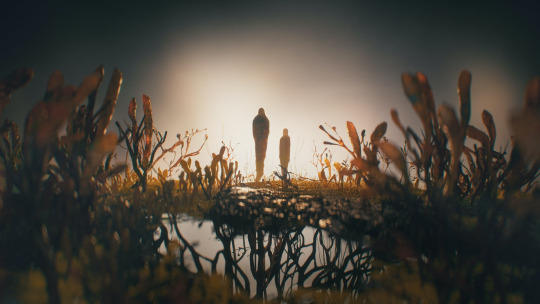
the opening credits already told us that.
#the last of us#tlou spoilers#the last of us spoilers#tlou#tlou hbo spoilers#tlou hbo#tlou meta#joel miller#ellie williams#david tlou#david the last of us
141 notes
·
View notes
Text
A very long (and Joel-Miller-apologist biased) TLOU hot take incoming:
I don't want to get too deep into my honest opinions about TLOU2 because even though I am quite critical towards it, I'm sincerely uninterested in engaging in any discourse about the game that has been going on for three whole years. Instead, I'll just talk about one thing that I consider to be a personal nit-pick that I don't see many talk about. This may be a hot take, so if you want to comment on anything, I kindly suggest you hear my side first ♡

[screenshot from MKIceAndFie's gameplay on YT]
One thing I wish was different with TLOU2 involves the scene where Ellie gets the truth of what happened in Salt Lake City, and I'm unsure if the writing is to blame, but I lowkey wish Joel... Defended himself a bit more?? 😭
Don't get me wrong, I absolutely understand Joel wanting to let Ellie be angry at him - she had every right. I found it quite bizarre that such an important scene (or at least the conversation) felt very... short? I feel like maybe it would have been more interesting to not only see Joel acknowledge how hurt Ellie is (again, her reaction is understandable and I'm not trying to say she's in the wrong at all) but also try to at least give his point of view of things, especially on why he did what he did to the Fireflies.
This, plus Ellie, albeit still heartbroken and furious, emotionally exclaiming how she feels, and why getting a cure was so important to her deep down. Or at least as well as she could put it in her current emotional state.
Maybe I am biased in this because I am a Joel Miller apologist until I die before I am my own person. Like, you may as well call me Saul Goodman because I'm practically this man's lawyer with how much I defend him.
In my opinion, he would be justified in saying that even if the operation was a miraculous success, the Fireflies would probably exploit her name by setting a price on the vaccine, or if a war between the Fireflies and FEDRA/other Factions erupts in order to seize it, killing more people than saving them. He would be justified in saying that they never asked for her consent and would wonder if they would still put her under the knife if she refused the offer. He would obviously know she was capable of making her own decisions but would also understand that she has Survivor's Guilt (something Joel may have felt before, especially after Sarah died and he didn't) and how that could affect her mentality/decision-making, especially at just fourteen years old. He would feel justifed if the operation failed and Ellie would have died for nothing, a risk he refused to take.
He would probably tell all these things to Ellie, trying to make her understand at least a little bit. But these reasons likely came to him after getting Ellie to safety. In his mind and heart, he might as well have had only one reason for doing what he did.
That reason being? It's simple. He loves her.
To him, that is more than enough, and Ellie may possibly realise this. Perhaps, after him listing out all those reasonings, Ellie might say,
"But all those things... They weren’t really the reasons why you did it, were they?"
"... No. They were not."
I definitely don't imagine Ellie would forgive him immediately, obviously. I still think Ellie would leave and not talk to Joel for some time, but with this interpretation, I'd imagine she would have a lot to think about in the meantime. Ultimately, I think it would have been a very interesting scene between these two verbally-repressed people who very much care for each other but are at a breaking point.
TLDR; I think there was potential to have this scene be a bit more "fleshed out" in terms of Joel expressing his intentions whilst also acknowledging and recognising Ellie's feeling of betrayal and heartbreak. Almost like a parallel to that "I'm not her, you know" scene in TLOU1.
#ranna word dumping#this may be a bit messy im sorry#these two make me sick i love them#the last of us#tlou#the last of us part 1#the last of us part 2#the last of us game#the last of us series#the last of us hbo#tlou game#tlou show#joel miller#ellie Williams#joel tlou#ellie tlou#tlou meta#hot take#unpopular opinion
33 notes
·
View notes
Text
Since the show put this eternal debate about the validity of Joel's decision back on track, I wanted to talk about it and explain why Joel was right. Note that I'm not talking about Joel's reasons so don't tell me "yes, but Joel wasn't thinking about that so...", that's not the issue. The issue is his decision in itself.
Btw, I specify here that I talk about the show but considering its fidelity to the games, my arguments also work concerning them.
So... let's take a look at Ellie. Firstly, she was unconscious at the time. There's just no way to justify that. Marlene or the fans who defend the Fireflies can speculate all they want about what Ellie would have wanted, the truth is that we fucking don't know. We know for sure that she wanted to help produce a cure, but at the time, no one knew that this would require opening her head and killing her.
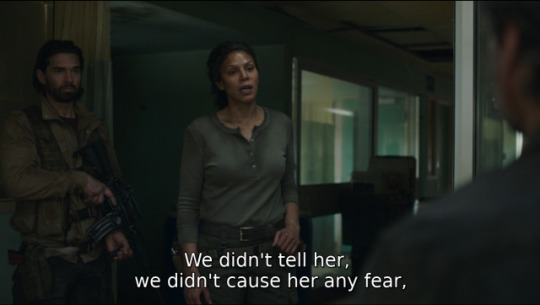
If Marlene was so sure of what she's claiming here, she would have woken up Ellie to give her the choice. But she didn't because she knows it's bullshit she's saying to convince both Joel and herself.
I'm sure I'll be objected that in TLOU 2, Ellie blamed Joel for preventing her from dying on the operating table and that given the fidelity of the series to the games, this will surely be the case in the next season. Yeah but that's irrelevant too, it's not the same Ellie. In a few years, especially during adolescence, we change a lot.
Then, since we're talking about Ellie's consent, I would like to remind you that regardless of whether she was conscious or not, she's a 14 year old girl. I have the impression that too many people tend to forget that, no one at that age can make the decision to sacrifice their life with full knowledge of what they're giving up and with the maturity to think about it properly. Especially when the 14 year old girl in question is victim of survivor's guilt after having seen several of her close ones die.


For those who have trouble visualizing what I'm saying, I'll make an analogy : If an adult slept with a 14 year old and the latter justified herself to you by saying that she was consenting and that it was her choice, would you find this relevant ? Of course not, because almost everyone knows that there are decisions that children/teenagers can't consent to !
Now that was just about Ellie, but what about the cure ? Because in spite of all the utilitarian debates about whether or not Ellie needs to be killed for the greater good, we're forgetting one essential point : What proves that the Fireflies could have made a cure ? Because whether it's in the games or in the show, there's no real evidence of that. Even the Fireflies don't know anything about it, Marlene and the others directly assume that they will be able to create a vaccine from Ellie's Cordyceps even though they barely had time to do some tests on her while she was unconscious.
Hey you know what ? Even Marlene implicitly admits that they don't know about it : "Our doctor… he thinks that the Cordyceps in Ellie has grown with her since birth (…) He thinks it could be a cure, Joel."
They literally had no plan or certainties, they didn't even take the time to conduct any in-depth study of Ellie, of her blood for example to find a way to produce a vaccine without killing her. They just chose the easiest solution out of impulsivity without worrying for a single minute about the opinion and safety of the concerned one.
Whether it was for the greater good or not, all of Marlene's justifications are based on biased assumptions and intellectual dishonesty. Joel hurt many people and was wrong about a lot of things but certainly not about stopping reckless morons from butchering his 14 year old daughter.
#the last of us#tlou#joel miller#ellie miller#ellie williams#joel and ellie#tlou joel#tlou ellie#tlou marlene#pedro pascal#bella ramsey#look for the light#the last of us spoilers#tlou season finale#tlou show#tlou spoilers#tlou hbo#the last of us hbo#tlou meta#the last of us meta#ellie#joel
74 notes
·
View notes
Text
I’m pretty sure I made a post on this before, but part of the reason why I like the casting of Joel and Ellie in the TV show is that the actors clearly don’t look related to each other. I feel that part of the reason why the game worked was that Naughty Dog designed Joel and Ellie so that they look like they could be related. They aren’t, but you feel a sort of familial connection there just purely on physical appearances. And “The Last of Us” isn’t the first game to do this trick, Telltale’s “The Walking Dead” also did the same thing with Lee Everett and Clementine.
Since the show can’t get away with that, there’s much more emphasis on the writing and the actors’ chemistry in order to sway the audience. Not to say that the game’s portrayal of Joel and Ellie is cheap, I’m just saying that it’s much harder for the show to portray Joel and Ellie as a father-daughter unit because it’s so obvious that they’re not related. On a related note, this is also why I didn’t mind that the actress for Sarah didn’t have the game character’s blonde hair since the actress looked like she could actually be related to Pedro Pascal. The casting actually makes sense from a story perspective.
With all that said, this makes casting Pedro Pascal even more brilliant since this is the guy that convinced the world he had a father-child relationship with Baby Yoda while not showing his face 99% of the time.
#tlou cast#the last of us#tlou#tlou meta#joel and ellie#joel and sarah#joel miller#sarah miller#ellie williams#pedro pascal#bella ramsey#nico parker#tlou hbo#hbo the last of us#hbo tlou#naughty dog#hbo max#tlou joel#tlou ellie#tlou sarah#tlou show
724 notes
·
View notes
Text
You ever think about how in the first episode Joel couldn't save Sarah, the person he cared for the most from a gunshot wound to the abdomen, and how ten years later Frank would be forced to save Bill, the person he loved the most, from a gunshot wound to the abdomen? And then do you also think about how Bill was telling Frank that Joel would take care of him, meaning Bill trusted Joel to protect the person he cared about most? God this show really is about the love and hope for the last people on Earth.
#the last of us#tlou#joel miller#sarah miller#frank tlou#bill tlou#bill and frank#frank and bill#tlou meta#sorry for the run-on sentences im crying while rewatching the show
132 notes
·
View notes
Text
Ellie and Dina would 100% be that couple that would send pictures to each other of the ugliest animals with the caption “looks like u”
#like#goood morning texts??? absolutely not#more like:#I had a dream u died lol#but then ravage each other later on I can’t cope I love them so much#ellie x dina#ellie williams#dina the last of us#the last of us#tlou meta
57 notes
·
View notes
Text
Druckmann stating David is a dark version of Joel is a -10/10 take absolutely not okay because them being parallels implies they share many similarities… David acting as a reflection of Joel’s role (as many of the character’s we meet mirror Ellie+Joel’s position in the story), though, is a 11/10 choice. I believe the showed really emphasized this and yeah, I get it seems nit-picky, but it’s important to note how paralleling the two characters in such a way serves to explain how differently they approach the role of guardian and what could have been if Ellie had met someone else. Additionally, it’s leading us to the conclusion that even a a good person (read: parent) doesn’t always do everything right (*spoilers if you don’t know the game*)
Joel and David are both older male figures who appear to want to care for Ellie. They set these two up for compare and contrast through the role of a “father” figure (an older caring mentor who can be responsible for her). The word “father” is frequently used in ep 8 when addressing Joel as well as when David refers to himself, expressing how both of them are random men who found their way into Ellie’s lonely life. There is also a sense of obsession the two have towards Ellie and keeping her around that is followed be violence, which is utilized as an expression/form of love. Their motives and characters couldn’t be more fundamentally different.
Initially, Joel has no interest in helping Ellie and no expectation of trust. Joel’s conception of a father seems to be the universal expectation of providing, teaching, fundamentally caring for a child’s well-being. The only reason he begins to open up to Ellie is due to circumstance and the ghost of his daughter, who he feels he failed; the association comes with a deep personal trauma by unconditional love. Furthermore, this sense of care is entirely one of a parent, exhibiting care so great that his well-being and even the world doesn’t matter as long as she’s okay
In contrast, David is clearly beyond words off the rails messed up. He does appears to have little to no understandable morals, exhibiting little inhibition to resorting to cannibalism, physical intimidation, sexual violence, and pedophilia. What’s more, from what he insulates, this is not a result of the apocalypse, a breakdown of humanity — instead, this is a part of himself now freed. The apocalypse has not caused this collapse of morals, it has actually justified his propensity for the inhumane. David sees the violence in Ellie, but he’s partially confusing this inclination, which has been fostered by humanity’s collapse, extreme traumas, and general survival. Honestly, I’m not going to even try to understand his mind or why he would think it’s okay to kidnap and potentially try to make Ellie his partner — all that matters for this is how David sees this action as caring for her and views himself in a father role by doing such (he crazy so don’t even try to ask how he came to those conclusions)
On a related tangent (trust me here), ep 8 emphasizes religion quite a bit, most noticeably in the way the community is steeped in some form of Christianity and David is a preacher. Less clearly is this reduction of religion (or a faith in God) to faith in an individual. David, as we learn more about him, seems to have a God-complex, framing his himself as a savior and leader in his community; he utilizes religion to frame his actions as unquestionable. Furthermore, while the usage of “father” is frequent and in places implies reference to, it never directly mentions a relation to God. the opening verse that David reads (Revelation 21:3-4) is also supportive of this, as it states, “God is with men, and he will dwell with them, and they shall be his people, and God himself shall be with them, and be their God.” Not only is David attributing himself to a God-like status, but also this position of a “father” as a leader of faith in correlation with Ellie.
We have seen the way Ellie mimics Joel, like in the beginning of ep 8 when she threatens David and James over the deer. She gladly follows his “teachings” and even seeks them, shown in the way she continuously begs Joel to tell her what to following his incapacitation. She’s also only kid and this has been the first time she’s ever been loved in this way, so there’s no reason for Ellie not to feel okay with relying on Joel with almost blind faith.
But Joel is not perfect and he is not prepared to teach a kid how to grow up in the apocalypse. While Joel and David provide similar offers (at least from their first impressions), Joel will never take advantage of Ellie in the cruel way David would have. It actually highlights Joel’s humanity, and so, even when he is torturing and killing men for information on her whereabouts, this feels justified since Joel is a good man and a good father. Joel may cross lines, but it is out of necessity OR maybe he just doesn’t cross too many/the wrong ones, so we’re still able to stand with him.
Nevertheless, this conflict of morals (being a good person in a world where, really, you die if you’re good) has an especially strong impact on Ellie, who is only 14. A major theme of the game and especially so for the show is the concept of violence and idea that, in Ellie’s world, violence has become a show of love. Mazin himself states how Ellie’s tendency for violence has been enhanced through Joel’s presentations of care being through acts of violence, tracing this back to Joel killing the guard in episode 2. David says this plainly to Ellie, how Joel kills a man not defending himself, but defending her. The lines that should not be crossed are blurred; in the apocalypse, do they exist at all?
David, disgustingly enough, leads us the answer: cordyceps love through violence, this is not how humans love. “People need a father” and Ellie is not beyond that. David accepts we’re all animals, but Joel continues to teach Ellie what it means to be more than that through the way he treats her equally, he worries for her, he kills only when necessary (iffy, but at least it’s not out of enjoyment), and simply cares. Ellie has warped violence as a form of love, however, this is not all she knows, which is what makes the end of TLOU pt. II all the more poignant. *SPOILER* albeit stuck in a cycle of violence, Ellie finally decides to end things with her choice not to kill Abby. Though I don’t particularly like pt. II and don’t know if it was perfect enough to justify killing off Joel, I can appreciate the ideas behind it and think the emphasis on forgiveness is a powerful statement
#the last of us#joel and ellie#joel tlou#joel miller#Ellie#tlou spoilers#tlou hbo#tlou show#tlou#tlou meta#tlou game#tlou ep 8
60 notes
·
View notes